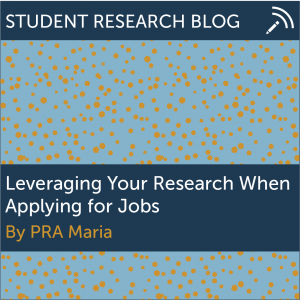 By Maria Latta, Peer Research Ambassador
By Maria Latta, Peer Research Ambassador
As the summer approaches, many of us are looking toward job and internship applications. If you are engaging in undergraduate research or creative projects, how can you use them to get a job or internship that doesn’t involved research? Often times students apply for jobs or internships related to their major or future career that don’t specifically include a research component. That doesn’t mean you can’t highlight the transferable skills that you have developed through undergraduate research in resumes and interviews to ultimately land you an offer.
Effective Communication
As a student researcher, you are constantly utilizing communication skills in research. From first approaching a faculty member to creating and presenting a research poster, you develop written and verbal communication skills. In particular, student researchers need to learn how to communicate their very specific research topic and methods to anyone. This means professors in your field who might ask challenging questions, other undergraduate students who have never heard of your topic, and community members who want to know what big picture impact UConn is making. You need to have excellent and adaptable communication skills to execute this successfully.
Initiative and Leadership
Students who have designed their own project have demonstrated both initiative and leadership. Whether it was for an honors thesis, with funding by OUR, or with a faculty mentor, student-led projects show an employer that you are the type of student who is willing to take on responsibility and can follow through. Planning, executing, and completing a research design involves collaboration, flexibility, and vision. These are all leadership qualities that employers are looking for in almost every position.
Problem Solving
Most job and internship opportunities are looking for students who can demonstrate their ability to solve unexpected problems and generate creative solutions. Research fits perfectly as an example of this skill. Almost all research projects come with unforeseen challenges and obstacles. Beyond just using research to solve a problem that you see in your field or in the community, you have to use problem solving skills to overcome roadblocks. Giving specific examples of how you approached these situations can give employers an insight into your ability to handle unexpected situations in order to follow through with a project.
When you are applying for a program or job that doesn’t involve research, it is very important to emphasize the various transferable skills that you gained. This is a great opportunity to provide specific examples of situations where you were able to demonstrate some of the soft skills that employers are really looking for. In particular, you want to highlight these points on your resume or CV. Using strong action verbs in your bullets that emphasize these skills can catch an employer’s eye and help you to stand out in the crowd.
Maria is a senior majoring in Pharmacy Studies and minoring in Molecular and Cell Biology and Sociology. Click here to learn more about Maria.